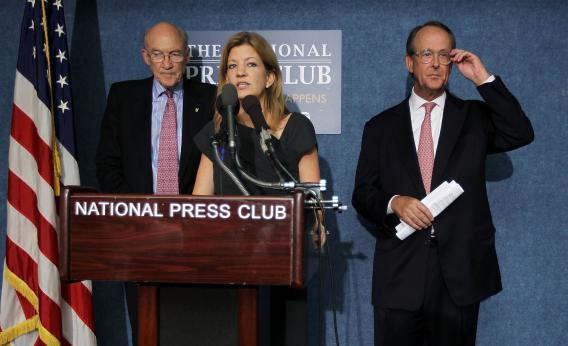Jon Cowan and Jim Kessler of Third Way had a piece in the Washington Post last week slamming liberals for losing interest in the grand bargaineering process:
There is a rising chorus on the left, most recently articulated in an op-ed Monday by Neera Tanden and Michael Linden [“Deficits are not destiny”] of the Center for American Progress, that our fiscal conversation should be declared over and plans for meaningful entitlement reforms mothballed. These voices argue that we can have substantial new spending on public investments, a secure safety net, no middle-class tax increase—all without addressing entitlement spending.
I will admit to having a conflict of interest here as I used to work at CAP and my wife recently started a job there, but how about a quote from what Tanden & Linden actually wrote?
Indeed, liberals have been leading on entitlement reform as part of a balanced approach to deficit reduction for the past four years. The Center for American Progress offered a detailed plan to reform Social Security that would achieve 75-year solvency while making the system more progressive, stable and eliminating its gender inequity. We also offered a Medicare plan that would continue to reduce costs for the federal government, saving $385 billion over 10 years, without shifting those costs onto middle- and low-income beneficiaries, businesses or states. These are good ideas, and Congress should pursue them.
That is rather different! The disagreement here is about politics, not economics. It would clearly be desirable for the long-term trajectory of Medicare spending to come in lower than what’s currently projected. And it would clearly be desirable for Social Security to go on some other long-term course than the currently forecast eventual exhaustion of the Trust Fund followed by a sudden benefits cliff. But in terms of the actual political situation, this is well-trodden terrain. We know Democrats will agree to cuts in these programs if and only if Republicans agree to higher taxes, and we also know that Republicans won’t agree to higher taxes. So operationally, all the pursuit of the grand bargain gives us is deadlock and artificial political crises.
By contrast, look at the immigration reform debate. The Gang of 8 immigration bill may well fail in the House of Representatives. But it might pass. It might pass because it represents ideas that have non-zero levels of support in both parties. And passing it would reduce the deficit in absolute terms, and reduce the deficit in share-of-GDP terms by even more. That deficit-reducing punch isn’t the reason to support the bill, but it underscores the fact that good public policy ideas in non-fiscal areas tend to reduce the deficit. In the short term, there is no deficit crisis and no prospect of finding a comprehensive agreement on fiscal policy. But there is some possibility of finding short-term political agreement in other areas. And ideas that create jobs and bolster economic growth increase the long-term sustainability of America’s fiscal posture. So the argument is that we should focus on those kinds of things, while waiting to see if future election outcomes produce a result that breaks the fiscal policy deadlock.
And frankly it seems like an airtight argument to me. The political parties in the United States are very very very divided on the question of taxes right now. So if your goal is to make actual legislative progress on something, you want to pick issues that don’t implicate the tax question. That means, insofar as possible, staying away from making long-term budget policy the center-stage issue in politics.
